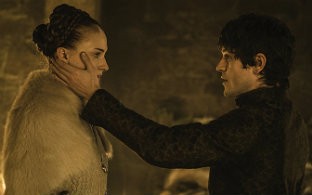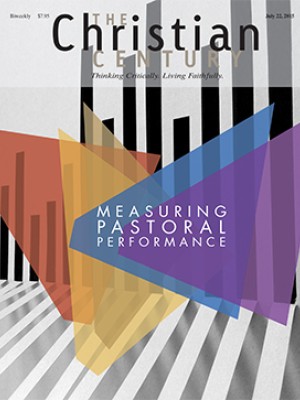Breaking the codes

HBO’s Game of Thrones is an epic story of intrigue and political violence with a bit of magic tossed in: winters that can last years, zombie-like predators, and dragons. Powerful families battle for the throne, and no character is safe from a gruesome death.
But amid all of the violence, one scene from the fifth season stands out in public opinion as particularly horrific. Sansa Stark (Sophie Turner), the daughter of the ruling Northern family, is raped by her new husband, Ramsay Bolton (Iwan Rheon). Ramsay forces another man, Theon Greyjoy (Alfie Allen), to watch, and when Ramsay and Sansa are offscreen, tears roll down Theon’s anguished face. The audience sees Sansa’s rape through Theon’s eyes.
Read our latest issue or browse back issues.
Sansa’s been through plenty of dark stuff before this episode. She was engaged to a sadistic prince who delighted in showing her the severed head of her dead father. She lost the rest of her family in various brutal ways typical of the series. But viewers were upset when Sansa was raped. Senator Claire McCaskill tweeted that she would no longer watch the show because the rape scene was “disgusting and unacceptable.”
The scene is horrific, but so are many others, and the first episode in the series also features a wedding night rape when Daenerys (Emilia Clarke), an exiled princess, is sold by her brother to a warlord. Why did Sansa’s rape bother viewers so much?
In From Shame to Sin, historian Kyle Harper writes about the emergence of Christian sexual morality in antiquity. He examines ancient Roman tales and observes that strong conventions protect the heroine from rape. The heroine, who is always beautiful, virginal, and privileged, is always rescued at the last minute. When she’s abducted by pirates, for example, a slave girl appears and is raped in the heroine’s place. Diabolus ex machina, the heroine stays a virgin while women who do not enjoy protected status experience the brutality in her stead. In Roman sexual morality, some women deserve protection while other women do not.
Maybe the outcry over Sansa is due to the fact that other instances of brutality in Game of Thrones seem to respect these codes, which remain relevant in our culture. When Daenerys is raped, the audience barely knows her, and she goes on to become a power monger in her own right. When the show’s evil queen or one of its many prostitutes is raped, perhaps viewers assume, at some not-quite-conscious level, that their rapes are not deserving of our outrage. But Sansa is beautiful, rich, and a virgin. Sansa is, like a heroine in ancient Roman fiction, an “innocent” character. The audience knows her and, like Theon, has seen her grow up.
Ancient rules of storytelling require that the pretty princess is safe from rape. If there’s a genius to Game of Thrones, it’s in the writers’ ability to wrench our assumed narrative protections out of place.
According to Harper, Christian sexual morality undid those Roman narrative conventions. Christians believed that both noblewomen and slaves were deserving of protection and that everyone had dignity that could not be stolen away, no matter what horrors might be suffered. Harper examines Christian stories in which the heroine is raped but does not lose her status as heroine. She is not destroyed by what has happened to her because she is precious, dignified, and created in the image of God. She is not a commodity that can be devalued by sexual violence; she is a person who can survive and move on to live a new life.
Two thousand years later we still have these stories to tell. Sansa’s rape is a horror, but if we’re up to watching a depiction of brokenness as unflinching as Game of Thrones, we need to look it in the face. And weep.






